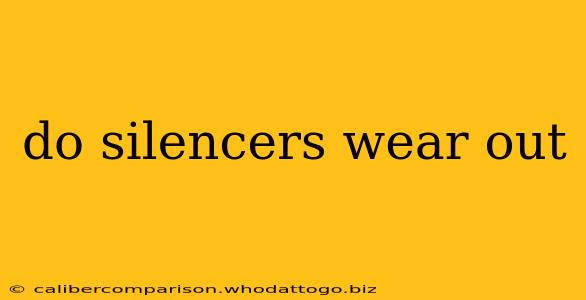Suppressors, often mistakenly called silencers, are devices attached to firearms to reduce the sound of gunfire. While they significantly reduce noise, a common question among firearm owners is: do silencers wear out? The answer is a qualified yes. Like any mechanical device subjected to repeated high-pressure events, suppressors will eventually show signs of wear and require maintenance or replacement. However, their lifespan can vary significantly depending on several factors.
Factors Affecting Suppressor Lifespan
Several key factors influence how long a suppressor lasts before requiring significant maintenance or replacement:
1. Frequency of Use:
The more often a suppressor is used, the faster it will wear. Consistent use exposes the internal components to more heat, pressure, and corrosive byproducts of combustion. A suppressor used on a daily basis will naturally degrade faster than one used only occasionally for recreational shooting.
2. Caliber and Cartridge Type:
Larger calibers and high-powered cartridges generate significantly more pressure and heat. This increased stress accelerates wear on the suppressor's internal baffles and other components. Suppressors designed for subsonic ammunition will generally experience less wear than those designed for supersonic rounds.
3. Cleaning and Maintenance:
Regular cleaning and maintenance are crucial for extending a suppressor's lifespan. Failure to clean a suppressor allows corrosive residue to build up, leading to accelerated erosion and potential damage to internal components. A properly maintained suppressor will last significantly longer.
4. Material and Construction:
The materials used in the construction of a suppressor play a vital role in its durability. High-quality suppressors are typically constructed from durable materials such as stainless steel or titanium, which are more resistant to wear and corrosion. The design and precision manufacturing also influence longevity.
5. Environmental Conditions:
Exposure to harsh environmental conditions, such as extreme temperatures or moisture, can accelerate corrosion and wear. Storing a suppressor in a damp environment can significantly reduce its lifespan.
Signs of Wear and Tear
Recognizing the signs of wear is essential for timely maintenance or replacement. Look out for:
- Increased Noise: A noticeable increase in the sound level suppressed could indicate baffle damage or wear.
- Loose Baffles: Check for any looseness or play in the suppressor's components.
- Damage to the Outer Can: Inspect the exterior for dents, scratches, or significant wear that could indicate underlying internal damage.
- Corrosion: Look for signs of rust or pitting, particularly on internal components.
- Excessive Build-up: Accumulation of carbon, fouling, or other residues can indicate improper cleaning or excessive use.
Maintaining Your Suppressor
Proper maintenance is crucial for maximizing the lifespan of your suppressor. This typically involves:
- Regular Cleaning: Clean your suppressor after each use, paying close attention to removing all residue and fouling. Consult your suppressor's manufacturer for specific cleaning instructions.
- Inspection: Regularly inspect the suppressor for signs of damage or wear.
- Proper Storage: Store your suppressor in a clean, dry environment to prevent corrosion.
Conclusion
While suppressors are durable devices, they do wear out over time. The rate of wear depends on several factors, including usage, caliber, maintenance, and environmental conditions. Regular cleaning, inspection, and proper storage are essential for extending the lifespan of your suppressor and ensuring its continued effectiveness. If you notice any signs of wear or significant noise increase, contact a qualified gunsmith or the suppressor's manufacturer for assessment and repair.

